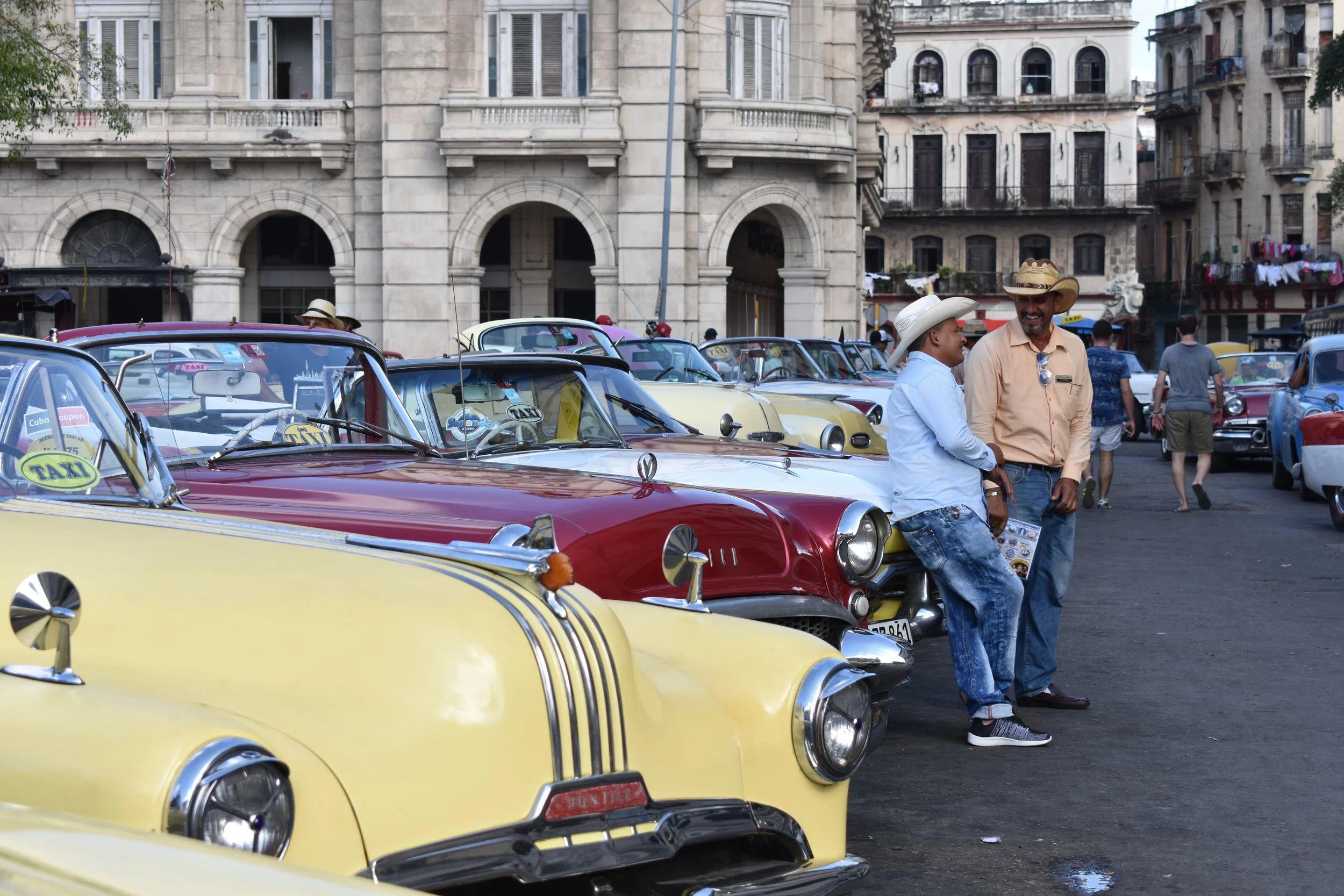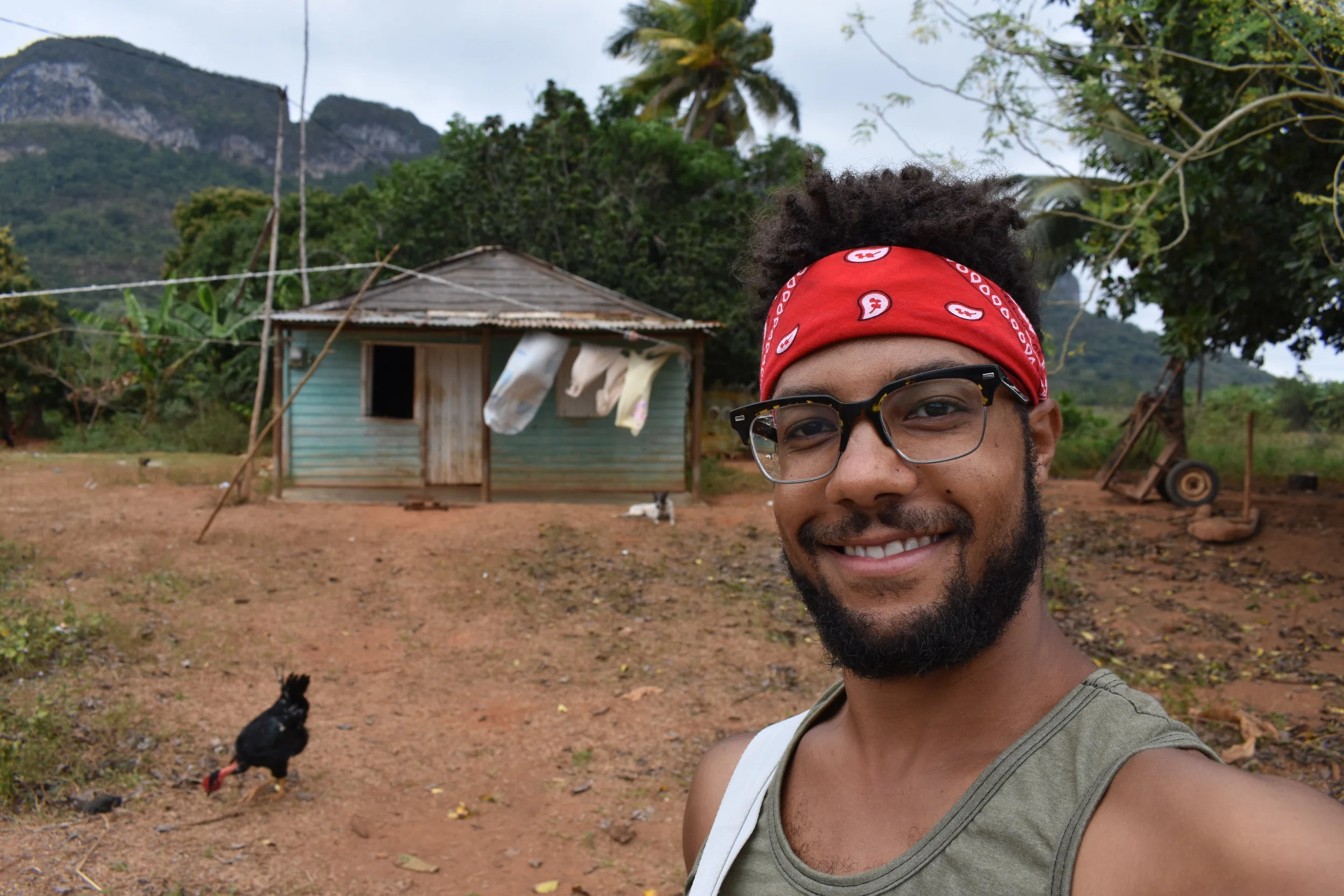“Quizas, Quizas, Quizas.”
“How long will you be in Cuba for?” Mario, a waiter at La Berenjena, in Viñales, asked. “Three weeks,” I said in between bites of their delicious black bean crepes. “Three weeks? Wow, that’s a lot of time here.” “Somehow, I don’t think it’s enough.” “Well, what are your plans for tomorrow?” he asked. By this time, I was used to people asking this question as a segue into, “Well, I know of the best x, y and z...and for a small price of (insert price that’s not all that small) I’ll take you there.” But, I didn’t allow these skeptical thoughts to mar my perception of anyone who approached me and sought to offer a recommendation. Everyone just does what they can to get by, and in lands, like Cuba, where it’s difficult to attain any real level of wealth or amount of money beyond what’s necessary to survive (that’s sort of the point of Communism, right?) I couldn’t knock anyone’s hustle. In fact, I respected them more because of it. And I knew that for every few opportunities someone brought me, one, in fact, would be valuable enough to enhance my overall trip. Maybe Mario had one for me. So, I leaned closer and told him that I had no plans. At this, he smiled. “Well, why don’t you rent a bike and explore the town on your own?” “You’re right,” I said. “Why not?”
“What are your plans for today?” Flora, the woman who owned the Casa Particulare I was renting a room in asked as she brought me a plate of eggs, rice and beans and fruit. “I’m going to search for a bicycle and explore the town,” I said in a voice dripping with a brand of enthusiasm that every traveler has tasted. “Una gran idea, Mateo,” she said approvingly. “Go to the house across the street, the son of my friend rents bicycles.”
Fifteen minutes later, I had a bike for 10CUC (10USD) for the entire day. “When do I have to return it?” I asked the tall teenager with bleached hair in the shape of a mohawk. “Cuando termines.” With that, I gave him a nod and began to pedal my way along the dusty path doing my best to avoid a variety of obstacles that are no doubt specific to the countryside of any developing nation: horseshit, puddles that are deeper than they look, stray pieces of concrete and, take a guess, more horeshit. Unfortunately, the smell never really grows on you.
My first stop was the Cueva del Indio, which was about 6 kilometers (3.7 miles) from where I was. Not bad. The town of Viñales is fairly small, and extremely manageable to get around whether on foot, bicycle, scooter or horse and cart. Yes, horse and cart. Remember all of that horseshit I mentioned?
As I made my way through the town and out onto what I’ll call the, “main road,” I found myself racing against horses pulling farmers up and down hills against the backdrop of beautiful, hulking Mogotes, which are rock formations specific to Viñales and only a handful of other places in the world. The scenery was both breathtaking and a little overwhelming. With the horses and oxen, men toiling in fields and overall sluggish speed of life, one could briefly think that she were transported to the late 1800s. That is, until a vintage car emerges out of nowhere and disrupts the ambience as it chokes the air with its charcoal-black smoke. This was the picture I found myself a figure in as I made my way closer and closer to the caves.
A large sign told me I arrived. And, after leaving my bike with a woman who said she’d watch it for 1CUC, I made my way past a bizarre scene of actors and actresses portraying stereotypical indigenous people. As I watched the overly-savage scene unfold (the native man began to chase tourists around with a knife that may or may not have been real), I heard another man, a few steps away, playing a guitar and singing the sweetest melody. It was a song called, “Quizas, Quizas, Quizas.” This music lured me away from the faux natives and up the steps towards the opening of the caves.
Upon entering, I realized I was the only one there. The rocks solidified themselves into beautiful, dagger-like formations and, after walking for a few minutes, I could no longer hear the musician outside. I was encapsulated by a degree of silence I had never experienced before. It was as if the silence itself penetrated my body through its trillions of pores and stilled my heart so that I couldn’t even hear it beating. Standing there among the rocks and ceiling stretching towards the sky, the only thing I could do was breathe. My mind filled with silence. Was this what God felt like? I walked deeper into the cave and, after a while, came upon a makeshift dock in front of a river. Seconds later, I heard something. A motor. And as the sound came closer, I saw a boat holding what must have been twenty people in it; they were on a tour of the caves. Another boat came, this one empty, and told me to hop on for 5CUC (5USD). Afterwards, I exited the caves and re-entered at the beginning to do it all over again.
Osmandis
With my morning off to an exhilarating start, I hopped back on my bicycle and pumped my legs toward town. I then saw a sign that said, “Laguna del Piedra 8KM.” Stone lake? Of course I had to go. So, I veered off onto a side road and made my way up a hill in the direction of the Stone Lake. After reaching the top of a hill, I saw a quaint wooden house with chickens, pigs and clothes blowing in the wind. A perfect place for a photo. So, I hopped off my bike and began to take a few shots.
As the chickens and pigs did what chickens and pigs do, two men arrived. One in a straw hat and the other wearing nothing memorable. I waved to them and pointed to my camera. “Me gusta tu casa!” I shouted as they made their way behind the house. They gave me a nod and smiled. Moments later, the man in the straw hat emerged from behind the house. I decided to make a little small talk and asked them a question I already knew the answer to; the direction of the Stone Lake. The man told me where to go and, as I began to hop on my bike, he said, “Vamos.” “A donde?” I asked. “A la real Laguna del Piedra.”
As I walked my bike next to him, I began to wonder where we were going. Curious thoughts that only increased as he instructed me to turn down an unmarked path towards a destination I couldn’t see. “This is where he kills me,” I thought. “This is how I go. All of the things I’ve done. This is how it happens. I wonder if he’ll hack me up or tie each arm up to a different horse and make them run in opposite directions medieval style. I shouldn’t have hated on all of that horseshit before!” Then, I told myself to shut up. To trust. To stay as open as possible because that’s where the best adventures come from. So, we continued to walk and I eventually saw a woman boiling a pot of coffee. “Hola, quieres café?” she asked. “No, gracias.” “Mi esposa,” the farmer said as he gave her a wet kiss on the cheek. Not trying to be a Peeping Tom, I looked away and noticed a large structure being built. It looked like the frame of a small home. “¿Que es eso?” I asked. “One day,” he said as he stretched his hand towards the structure, “this will be a restaurant.” He then told me about his plans for having visitors from all over the world dining at this site, which he said was the actual and real Stone Lake, opposed to the fake one that the sign points to.
We walked all over his property, and he showed me the place where the lake usually is, and how it was dried up but will refill in a few months. I saw the bleached lines in the stone (you can notice them in the photo below), which told me that there is, in actuality, a lake here at points during the year. We explored caves on his property and walked around a bit more. “Como se llama?” I asked as I pondered at the fact that I had been hanging out with this guy for about an hour and didn’t even know his name. “Osmandis.” “Osmandis,” I repeated. “Es un nombre hermosa,” I said. I then snapped a photo of him. And, before leaving to see the “fake” Stone Lake, him and his wife asked me, once again, if I wanted any coffee, to which I politely declined (I never drink coffee).
Once again, I was on the road, albeit this time a bit changed. I was changed because of the hospitality that Osmandis offered me, without hesitation. Me, for all intents and purposes, a stranger, whom he welcomed onto his land and shared a few moments of his life with. The generosity of this man was astounding to me. And, I wondered at it. Why was he so open to me? Was it because I speak a fair amount of Spanish? Because I followed him without knowing where I was going? Because of my skin color, which was similar to his own? As the questions piled up, I silenced them and just happily accepted what had happened.
A Plate of Hospitality
Eventually, I arrived at the “fake” Stone Lake, which was just an unimpressive (and full) lake in front of a Bed and Breakfast. I didn’t even stop at it, and instead turned around and parked my bike in front of another small house (except a bit more built up), which stood in front of a Mogote that dwarfed it in size. As I’m sure you can already guess, I hopped off my bike and began to take photos of it. Minutes later, a small middle-aged woman emerged. I dropped my camera in case she thought I was being a bit intrusive, but she just smiled and stood next to me on the road. “Your house is beautiful,” I remarked. “It’s not my house, it’s my father’s. I live in the town.” “Oh,” I said. “Are you going to town?” she asked. “Yes, want to ride on the back of my bike?” She laughed and shook her head. “On these hills? We’re bound to fall off!” I began to picture the two of us in cartoon form bumbling up and down the hills while trying to keep all of our bags in one place. My daydream was quickly interrupted when she asked, “Would you like to come in?”
Unsure of what she meant and why she asked it, I said, “sure,” this time making sure I didn’t let any of the lethal visions I had back on Osmandis’ farm enter my mind. She opened up the door, and we were immediately greeted by a young girl. “My niece.” “Hola niña,” I said as I bent down to give her a high five. The house was extremely narrow and fairly long. From the front room, I saw a door, opened to what must have been a backyard, towards the end of the house. I followed her deeper into her father’s home, and met her brother, a skinny man with the sun-tanned face of a farmer, her graying mother, and, eventually, her father who seemed to be a bit ill. “This is the kitchen, this is the backyard, this is where we keep the pigs, this is where we store food,” she said with an air of excitement as if she were a real estate agent trying to push me into a sale. Either that, or she thought I was someone who had never been in a house before (I know I looked a little rough and dirty, but DAMN!).
When we made our way to the backyard, I asked her if I could take some photos. “Si, claro.” As I was looking at the enormous pig caged up in the backyard, I heard a car chugging along on the street. “Mateo, you just made me miss another ride!” she exclaimed. We laughed and then I asked her what the machine seizing in front of us was. It resembled a washing machine, but much smaller, and was shaking so uncontrollably that I was sure it would topple over. “It’s to clean our clothes. It’s from the Soviet Union, and is great for my brothers clothes, you know? They need something strong to clean all the dirt out after a long day’s work in the field. And, we’ve had this for forty years.” “Sixty years,” her brother interjected from the back porch.
Not wanting to outstay my welcome, I entered the house and thanked her for showing me around. “Do you want some food?” she asked. “No, no. I’m okay,” I said. “Are you sure?” For some reason, I felt as though it would have been rude of me to have declined (a thought that occurred to me back at Osmandis’ farm, but I really detest coffee), so I said okay. “I’m a vegetarian,” I mentioned, so that they didn’t go to the trouble of preparing meat. And while I felt like I was being picky, I’d rather have sounded picky than wasted their food. Her mother proceeded to get two eggs from the backyard. The woman, whose name I learned was Amaryllis, procured rice and beans and her brother brought in a banana in one hand and a few bones in the other, which I assumed were for flavor. “We don’t need the bones, he doesn’t eat meat,” Amaryllis said. “Doesn’t eat meat?” her brother asked as he scratched his head in confusion. I tried not to laugh at his face of confusion, which I’ve seen made in many other Spanish-speaking countries after I tell them I’m a vegetarian, but couldn’t keep it all in. After the meal was prepared, Amaryllis sliced up some tomatoes, lettuce and then put a large piece of Yucca on top. “Jesus,” I thought to myself. “How am I going to eat all of this?”
“Sit, sit!” Amaryllis instructed, to which I, of course, obeyed. Her mother watched me as I munched on the food, and Amaryllis, with eyes beaming, studied me. “What does the world think of Cuba?” she asked. After having been in the country for a few days, I was no longer a stranger to this question. “Well,” I started. “I can’t speak for the world, but I believe that, to many, Cuba is still a mystery.” Our conversation then took on a life of its own, and we discussed everything from the beauty of Cuba, and how happy and kind the people are to the advantages of me traveling alone. “For example,” she started, “you wouldn’t be sitting here if you were in a large group. I always thought Americans traveled in groups?” “Not this one,” I replied as I attempted to stuff my stomach quickly enough before it realized just how much food was actually in it. We joked back and forth and the same question of where this hospitality was coming from entered my mind. I again wondered if it was due to my personality, my skin color or something else. And, again, I released myself from the question and just relished the moment; the generosity of this family who not only welcomed me into their home, but both trusted and treated me as if I were an old friend or relative.
After I kissed her mother goodbye and bid farewell to her brother, niece and father, Amaryllis and I went back to the road. “You’ll always have a home here,” she said. “Thank you,” I replied, still in awe of her unwavering generosity. As we stood there, a large tractor with a bed attached to it came and she hopped on the back. “Mateo, throw your bike on here and hop on!” she yelled. “It’s okay!” I shouted back above the roar of the tractor’s engine. I wanted to ride. I wanted to feel the wind in my hair and continue to feel what I was feeling. It was the same feeling I had back earlier in the caves, a sense of stillness. Of feel as though there are no real strangers in this world. I guess if I had to find a word to describe it, it would be grateful. I was, and still am, grateful for these examples, among many others, of humanity that I’ve been able to experience. I hope you can feel it through my words.
With my legs pumping faster and faster, I came upon a realization that I had long ago, but had forgotten. The realization that generosity doesn’t need to be explained or questioned. That, like breathing, it should be both reflexive and inherent to our survival. To be hospitable, regardless of whether someone is an old friend or even a person whose name you don’t know, is to be human.
What other places in the world give you the same feeling of hospitality? Let us know in the comments below!
Originally posted on SwagPapi.com: http://www.swagpapi.com/travel/a-plate-of-cuban-hospitality/















